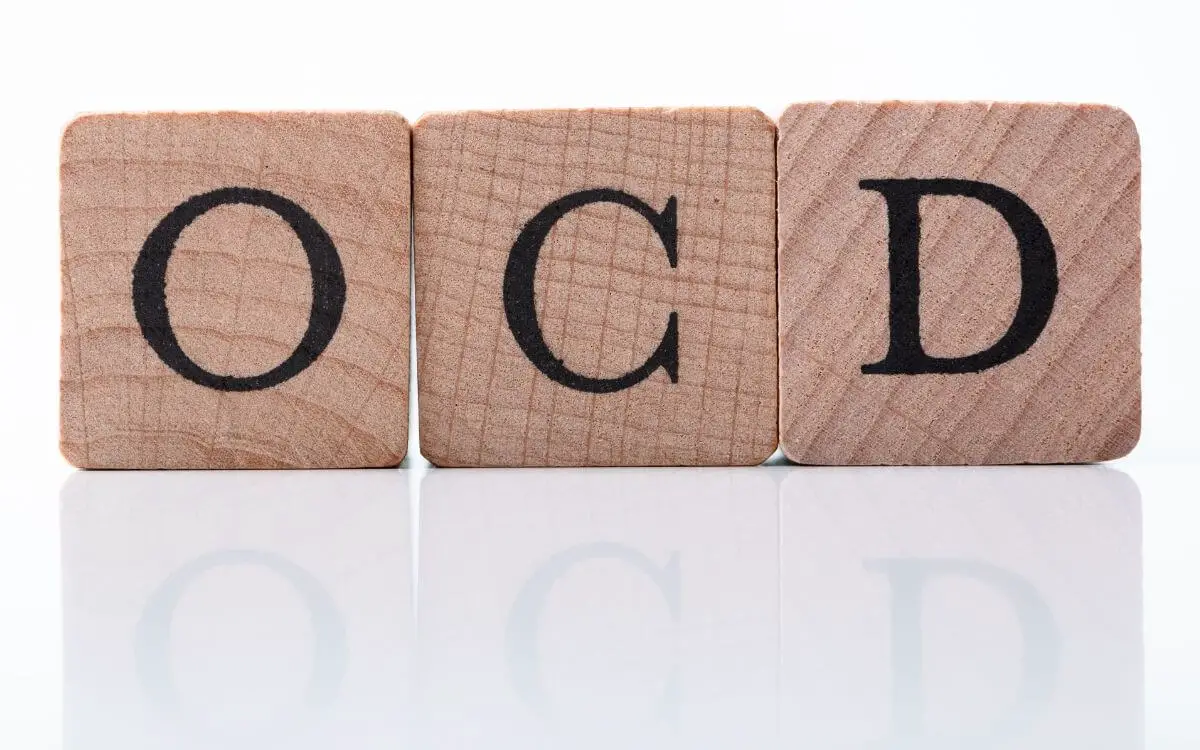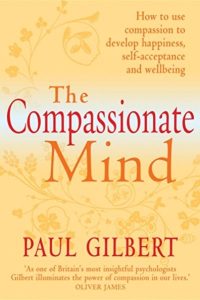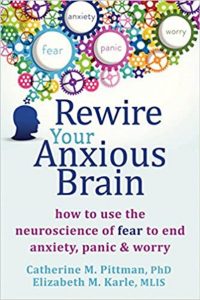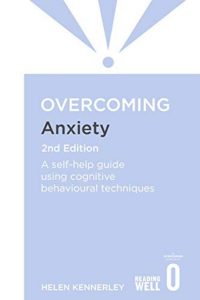OCD treatment. M’s story…
O.C.D. treatment.
OCD treatment – we’ll get to it towards the middle of this article, but first…
Living with an OCD mind is difficult. I have suffered from some form of anxiety disorder for as far as I can remember going all the way going back to childhood, but later on, in my teenage years, things got more complicated.
I started to develop Obsessive-Compulsive Disorder (OCD) behaviors, alongside an eating disorder that manifested firstly with anorexia and then bulimia.
In fact, to some extent, Obsessive Compulsive Disorder and eating disorders are connected as they are both forms of obsessive-compulsive behavior that are acquired by people in order to somehow get control over their lives!
I never completely grew out of my eating disorder until recently, and I think that was partly due to being a dancer and feeling pressure to keep my weight down.
At the age of 18, I started to eat more healthily and got to a healthy weight. However, whenever I was under stress or felt like I had put on a bit of weight, I found myself using the same controlling methods to lose the extra few pounds I had gained as soon as possible, either by skipping meals, doing more exercise, or vomiting after a big meal.
At the age of 44, I can honestly say that my eating disorder is behind me for good, but my OCD isn’t, and this is something that is so ingrained in me that I fear it will never completely leave me!
I have learned to manage my Obsessive Compulsive Disorder behavior over the years, but at times of extreme stress, I still find it rears its ugly head.
So what is O.C.D?
OCD or Obsessive Compulsive Disorder is a mental health condition characterized by obsessive thoughts and compulsive behaviors, to be diagnosed with this condition a person needs to have one or both of these and the symptoms have to cause distress, significant impairment, and take up a lot of a person’s time.
It’s normal for most people to sometimes want to go back and double-check that the heater has been switched off, the windows closed, or the doors locked, or maybe even worry that you might be contaminated by germs or have a violent unpleasant thoughts.
But with Obsessive-Compulsive Disorder, the violent and catastrophic thoughts are persistent, unwanted, and distressing for the sufferer and they won’t go away until a task or number of tasks has or have been completed i.e. checking and re-checking doors and windows are locked or washing and re-washing hands or cutlery.
The sufferer feels compelled to repeat these tasks or perform certain rituals as they believe that if they don’t the thought that they had will come true and something bad will happen either to them, their loved one, etc.
The sufferer realizes that these behaviors are not logical, but nevertheless feels compelled to engage in them due to significant distress, anxiety, and fear that the thoughts cause them.

A person who doesn’t have OCD may have thought about harm coming to themselves or someone they love, but they are able to stand back from this and see this as just being thought.
People suffering from Obsessive-Compulsive Disorder (OCD) become very upset about what the thought might mean, they might think that it is immoral to ignore the thought or that having the thought makes them responsible for any harm that might come to themselves or other people. They, therefore, feel compelled to act to prevent any harm from happening.
People find it difficult to understand why people with OCD feel so compelled to ritualize when they know deep down that the chances of anything bad happening are very low.
However, people with Obsessive Compulsive Disorder tend to feel very responsible for even very unlikely events and see any possible responsibility or blame as being unbearable.
They then try to neutralize the thought to put things in balance or put things right by thinking of some other thought or doing some task or ritual such as washing hands, checking, etc.
What is worse is that it becomes a vicious cycle because sometimes no matter how much the person completes the task or ritual, they never feel it is enough and always carry the feeling of anxiety or fear around with them.
Why did they develop O.C.D?
There is a history of anxiety, depression, and addiction in my family, so It could be possible that I have a genetic predisposition to mental illness, although nobody in my family has suffered from Obsessive-Compulsive Disorder or an eating disorder.
However, as a child, I was exposed to lots of heated arguments between my parents that involved my dad being verbally and physically abusive towards my mother, and sometimes even my grandparents got involved because they were trying to protect her.
I remember feeling traumatized by these events and feeling very vulnerable and scared.
I was previously quite an outgoing child, but around the age of 7, I started to become quite withdrawn and suddenly became very shy and doubtful. I then suffered bullying on and off throughout my school years and even a dance school, possibly because I was an easy target, sensitive, and easy to upset.
I always did well academically, and I always achieved top marks in my dance exams, but often found myself outcast socially, always trying my best to fit in and to please everyone. I guess I was trying to be perfect so that people would like me and treat me well.
I always had a looming fear over me that something awful might happen at any moment either at home or at school and I never trusted anyone.
I guess I thought that if I made everything as perfect as it could be and checked and double-checked that everything was in order, then my life would stay in order and everything might turn out alright.
My OCD behavior was a way to gain some order in my life and possibly some control. The only thing was that although I felt I was in control of things, I was never in control, it was in control of me because truth is that Obsessive-Compulsive Disorder is a bully itself!
It’s like a little voice inside your head telling you that you must do a certain thing, act a certain way, or be a certain way because otherwise, life will go bad for you and everyone around you.
In fact, in my adult life, Obsessive-Compulsive Disorder (OCD) has replaced the bullies from my childhood, rearing its ugly head whenever I feel stressed or vulnerable. In fact, at times of extreme stress, I have felt just like the scared child and teenager I was before, even though I am a grown 44-year-old woman with quite a strong character, mind, and opinions.
Unfortunately, the mental scars from the past are so deeply ingrained in my mind that I still have to work at keeping my Obsessive Compulsive Disorder, anxiety, and depression in check!
How do I cope with living with O.C.D?
I have done lots of reading on the subject and regularly go back to reading books about how to overcome OCD just to reiterate the strategies and methods I was taught by my therapist to keep it at a manageable level.
I also am lucky enough to have the support of my amazing husband and have also gained support, from other family members who previously didn’t understand the condition, but it has been hard work.
I have also attended an OCD support group from time to time when I feel things are starting to get on top of me again.
Coping with my O.C.D. without medication:
I have managed to keep my Obsessive-Compulsive Disorder under control up to now without the need for SSRIs (antidepressant drugs).
I was firmly against going back on them, as I had previously been on an SSRI drug called Fluoxetine (commonly known as Prozac) from the age of 18 until the age of 37, but it gave me side effects and didn’t really work for me in terms of dealing with my anxiety and OCD, it just made me feel quite flat and without any drive!

I still got anxious and depressed, but I just used to hide away for a while, I avoided conflict by running away from situations and giving up, and I slept an awful lot.
After coming off the tablets, by tapering the dose slowly, I started to feel that I had more energy, I started to care more about things, and I found I had more drive.
Of course, caring more about things made me become more emotional at first and therefore even more anxious, and really, I should have come off the tablets with the help of a therapist, but he was never offered to me.
I found out the hard way when my anxiety came back with a vengeance and so did my Obsessive-Compulsive Disorder (OCD) the first thing the doctor said was that I should go back on the tablets, but they also offered me some CBT therapy.
I decided to stay off the tablets and stick with the therapy and I am glad I did.
I almost felt like throughout the 19 years that I was on the tablets, I had never really grown up emotionally because I had never been offered the opportunity to discuss the reasons I felt the way I did or been given the correct strategies to fight against my anxiety and Obsessive-Compulsive Disorder.
In fact, throughout that whole period in my life, I felt like was never in control of anything I just let things happen to me and people happen to me, almost as if I had no choice in the matter. I had never even heard of OCD and just hid it the best I could from people, in case they thought I was mad!
Don’t do it alone!
Please know that I am not advising anyone to not try SSRI drugs (i.e. Prozac, Citalopram, Sertraline, etc.) for OCD if they have been prescribed them along with CBT therapy, as sometimes a combination of the 2 together can be very beneficial for some people.
However, the aim is to be on the SSRI drug short-term rather than long-term, where possible.
Also, SSRI’s for Obsessive-Compulsive Disorder (OCD) without specific CBT therapy for OCD rarely work, and if it does help, once the SSRI is stopped the OCD comes back with a vengeance.
When it comes to taking anti-anxiety medications for any anxiety disorder, I would strongly recommend that you don’t just take the medication that the doctor or psychiatrist prescribes without getting a referral to an accredited CBT therapist for an assessment, in other words, “don’t go it alone!”. Also, if you are seeking a private CBT therapist, make sure to do your research before embarking on any assessments or therapy with them.
If you are based in the UK then all CBT therapists have to meet a certain standard before they can work for the NHS and they are all accredited BABCP (British Association for Behavioural and Cognitive Psychotherapies).
However, if you are going privately there is a website that you can check out to find a BABCP accredited therapist via this link.
Another helpful link to have is the one for Mind Charity which also provides information and support on all types of mental health problems.
One important thing to remember is that psychiatrists are not experts in psychological therapy, although a lot of people are under the impression that they are.
Psychiatrists are physicians trained to treat psychological problems primarily through the use of medications. On the other hand, CBT therapists are experts in psychological therapy, but they are not qualified to prescribe medications.
So if you are seeing a psychiatrist or your GP and they are prescribing you medication, it is extremely important that you also see a psychotherapist or CBT therapist to work through why you are feeling the anxiety/depression or suffering from obsessive-compulsive behavior, etc. and develop strategies to combat those feelings for more long term benefit.
I will write more about the importance of CBT therapy and also the effects of medications on anxiety disorders in a separate article, as it is a very complex subject!
The difference between General Anxiety & O.C.D.
In short, people who are suffering from GAD tend to jump from one anxiety to another throughout the day or have a general sense of feeling overwhelmed.
Someone with Obsessive-Compulsive Disorder (OCD) is more likely to obsess on particular anxiety or a few particular anxieties and devote excessive attention to these anxieties.
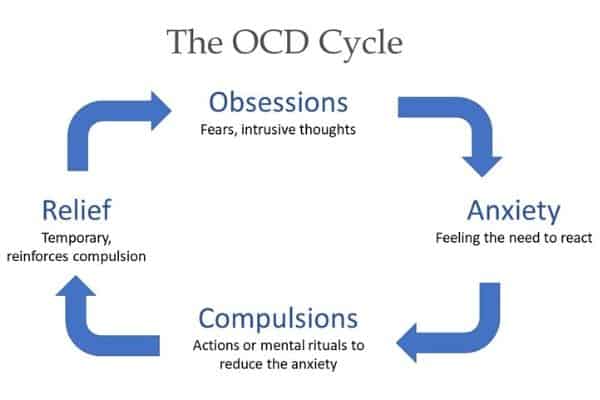
With OCD people obsess about largely irrational and improbable things, such as will I get a terrible disease by touching this? What if I take a knife in the kitchen in my sleep and stab myself or someone else in the household by mistake?
If I don’t check the doors are locked something bad will happen to someone I love.
This kind of thought is accompanied by the obsessive urge to check things or to repeat rituals in order to neutralize the anxiety so everything feels ok.
GAD is usually about general real-world concerns such as; Will I pass this test, or will I fail it? Will I get this job? Does my colleague at work like me? Is my friend angry with me? Will the plane crash?
People with GAD worry about the worst possible scenario and how it might play out and this causes excessive and debilitating worry, but they do not feel the need to ritualize or perform compulsive tasks to reduce their worry.
However, it can be very difficult to diagnose a condition on your own, as sometimes you can be suffering from 2 conditions at once, as GAD and OCD often overlap, and this is why it is important to have a professional assessment carried out by an accredited CBT therapist.
When I first presented with a flare-up of anxiety and OCD a few years ago, I was diagnosed by the first therapist I saw with GAD and completed treatment for this, which helped me conquer a lot of the general anxieties and panic attacks I was suffering .
However, underneath it all, I was still using my Obsessive-Compulsive Disorder (OCD) behaviors as a coping strategy and this wasn’t spotted until I saw a second therapist who asked me to complete two questionnaires as part of my assessment; one for GAD and one for OCD.
She then diagnosed my anxiety disorder as being more Obsessive-Compulsive Disorder orientated and I started the correct therapy for my main problem.
How to assess whether your anxiety is a source of obsessive thinking?
Do any of the statements below apply to you?
- I can spend a long time thinking and rethinking certain events in my mind.
- When I make a mistake or forget something, I feel guilty and it takes a long time for me to come to terms with it.
- If a friend or relative disappoints me, it can take me months to get over the upset and get on good terms with that person again.
- I regularly become preoccupied with arranging, counting, or evening things.
- I feel I need to repeatedly check things in order to reduce my anxiety.
- I can’t stop thinking about the risk of being contaminated with germs or chemicals and thinking about an illness or even death.
- I regularly have unpleasant thoughts that I can’t shake and they distress me
I myself can identify not with just one or two of these statements, but with all of them. At times in my life when I have been particularly stressed, all of these worries and compulsions have been present in my mind at once. At other times, when I have been less anxious, I have only suffered from one or two.

But you can imagine how difficult life can become if you are having all of these obsessional thoughts and having to give in to all of these compulsions at the same time!
When I first got diagnosed, I had been suffering from all of the above as I was going through a particularly tough period in my life and had even been having suicidal thoughts, and thoughts of self-harm. Some of my Obsessive-Compulsive Disorder (OCD) behaviors were as follows:
- I would lay in bed for hours unable to sleep thinking about things that had happened in the day, whether I had done or said the right thing, or thinking about a future event and how it might go, thinking up a million outcomes to the situation until I drove myself mad.
- If I made a minor error at work, I would keep going over it in my mind, telling myself how stupid I was and thinking about how I could have avoided It. Also, feeling so guilty about it and feeling like staff or patients might make a complaint about me (I work for the NHS).
- When I had arguments with family members or friends, I would get extremely upset for days or even weeks. In fact, at one point I didn’t speak to my father for 6 months because of something nasty he had said to me in an argument, although I know deep down he didn’t mean it, I just couldn’t help going over and over it in my mind.
- I wanted to make sure that numbers in my bank account were rounded up and even, and when I signed of text messages I needed to sign off with an even amount of emojis.
- I got upset about things at home not being in order, tidy and clean, as it made me feel I was in a dirty environment.
- I got into a habit of checking my bank account over and over to make sure my money was there, and I had definitely paid the bills. I also checked and re-checked passports and tickets that I had booked to go away on holiday, just in case I had somehow lost them or maybe made a mistake and booked the ticket for the wrong time or date.
- I kept checking that all doors and windows were shut before going to bed or going out of the house and that all the electrical appliances and gas was turned off. Sometimes I felt I need to repeat these checks 4, 8, or even 16 times.
- I was continually washing my hands, plates, and cutlery for fear of contamination and using antibacterial hand gel at every opportunity.
- I regularly had disturbing and graphic thoughts about bad things happening to members of my family or myself, involving them or me getting hurt in an accident and dying or getting ill and dying.
Starting to tackle O.C.D.
Helpful insight into how Obsessive Compulsive Disorder works can be found by clicking on this link.
Below are some exercises from a book that I read whilst I was in a therapy called “Break Free from OCD” which you can buy through this very link. It was recommended by my therapist and helped me a great deal to understand how my thinking needed to change in order to tackle my OCD behaviors.
I did these particular exercises for my Obsessive-Compulsive Disorder (OCD) around contamination, but I also had to complete the same exercise for other areas of my Obsessive Compulsive Disorder behaviors, such as checking my bank account over and over, or checking all the doors and windows in the house were locked, rumination and disturbing thoughts, etc.
ANXIETY-RELATED TO BELIEF
- I am responsible for preventing the spread of contamination/dirt/germs and stopping something bad from happening – illness or death.
HOW IT KEEPS THE PROBLEM GOING
- No one can actually stop the spread of all dirt/ germs/diseases.
- All your efforts to try and reduce the risk actually focus on the potential danger and lead you to feel more responsible, not less.
ANXIETY-RELATED TO BELIEF
- If there is any risk that something is dirty/contaminated I must do something about it.
HOW IT KEEPS THE PROBLEM GOING
- By not taking the risk, you don’t get to find out that actually, nothing bad happens.
THEORY A: OCD SAYS
- The problem is I will get contaminated with dirt, germs, or disease and die
EVIDENCE
- People die from infections
THEORY B: OCD SAYS
- The problem is that I worry that I will get contaminated with dirt germs or disease and die
EVIDENCE
- I worry about lots of things that never happen
- I have read lots of things about diseases that have made me worry more
- It is actually very rare for people to catch these diseases and die
THEORY A: OCD SAYS
- The problem is that I will get contaminated with dirt, germs, or disease and die
If this is true what do I need to do?
- Wash my hands every time I touch something, I think might be dirty
- Use alcohol and wet wipes
- Wash hands until they “feel right”
- Use anti-bacterial spray several times a day on all surfaces
- Keep on the lookout for marks on objects
- Ensure that I don’t spread germs or disease to others
If I keep following these rules what will happen in the future?
- I will need to do more and more cleaning and checking; this will take over my life
THEORY B: OCD SAYS
- The problem is that I worry that I will get contaminated with dirt, germs, or disease and die
If this is true, what do I need to do?
- Ignore thoughts about the disease
- Treat worries as worries – not as signs of imminent danger
- Freely touch things when out in public without washing my hands
If I keep following these rules what will happen in the future?
- I can do what I like with my life
- I will feel free
- I will have more time to think about and do more constructive things
THEORY A: OCD SAYS
What does this say about me as a person?
- I’m vulnerable, I get sick easily
THEORY B: OCD SAYS
What does this say about me as a person?
- I am sensitive and have an anxiety problem, but I am no more vulnerable than anyone else
- I am actually stronger than I think
- I am a determined person who wants to tackle this problem
I recommend reading the whole book even before you start therapy as it goes into much more detail about the condition and how to tackle it with more of these types of exercises.
It also explains how Exposure and Response Prevention (ERP) works, which basically involves putting yourself in situations that trigger your Obsessive-Compulsive Disorder (OCD), but not allowing yourself to complete your compulsive tasks or rituals to neutralize the anxiety.
This is something that you should definitely work through with the guidance of your therapist.
“Break Free from OCD” is available to purchase on Amazon right here!
Another very interesting book that I read that I found helpful for both GAD and Obsessive Compulsive Disorder is “Rewire Your Anxious Brain”. The book is available to purchase on Amazon right here!
Wishing you all the very best in your battle with Obsessive-Compulsive Disorder (OCD)! I hope this article was helpful, wishing you a speedy recovery, and don’t forget to comment below. Take care!
PS!
I tried to grasp as much support as I could, all in search of a solution, to help me answer questions I had and so I began by reading a lot of books.
These books are very helpful in helping you understand your anxiety and helping you get out of the cycle.
You may access these books by clicking either on the links above or the book covers below…

My wife has read this book in a jiffy! It helped her during her dark times to find compassion and love for herself. For somebody like M, who suffered from severe depression, I noticed that her harshest critic of her was herself. It is never helpful to be told to pull ourselves together by others but saying it to ourselves leads us in only one direction – into terrible despair.
I listed this book because M also suffered from anxiety at that time, it helped her mindset and depression. Obsessing, ruminating, and dwelling on things may or may not happen, but this book makes it simple to understand, how to manage your fear. Your brain is a very powerful tool, and the more you work to change your mindset, the better you’re going to feel.
This is another book that my wife reached for during her depression because it offered my wife a self-help program, written by one of the leading authorities in CBT. M also suffered at the time from OCD. A whole range of anxieties and fears are explained, from panic attacks and phobias to obsessive-compulsive disorder and anxiety. That really helped her!
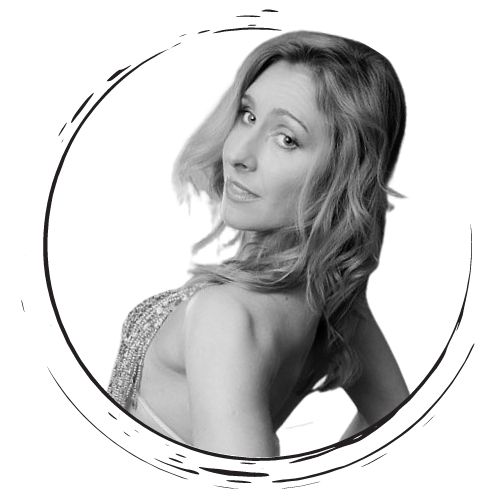
About M.
I’m M, Lucjan’s wife! At the age of 44, I found out that I suffer from endometriosis, which has taken years to diagnose. The following year, I was also diagnosed with fibromyalgia disorder…
